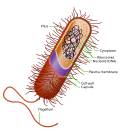A prokaryote (/proʊˈkærioʊt, -ət/, less commonly spelled procaryote) is a single-cell organism whose cell lacks a nucleus and other membrane-bound organelles...
44 KB (4,770 words) - 11:49, 31 July 2024
wall Capsule Pili Marine prokaryotes are marine bacteria and marine archaea. They are defined by their habitat as prokaryotes that live in marine environments...
140 KB (12,943 words) - 07:17, 4 July 2024
Nutrition (section Prokaryote)
unavailable. Prokaryotes, including bacteria and archaea, vary greatly in how they obtain nutrients across nutritional groups. Prokaryotes can only transport...
36 KB (4,031 words) - 07:45, 25 July 2024
They constitute a major group of life forms alongside the two groups of prokaryotes: the Bacteria and the Archaea. Eukaryotes represent a small minority...
61 KB (6,081 words) - 01:05, 28 July 2024
animals (including protists), plants (also including algae and fungi) and prokaryotes (bacteria and archaea), is Latin and binomial in form; this contrasts...
27 KB (3,079 words) - 11:08, 24 April 2024
prokaryotic cells, which lack a nucleus but have a nucleoid region. Prokaryotes are single-celled organisms such as bacteria, whereas eukaryotes can...
60 KB (6,271 words) - 05:34, 21 July 2024
Circular chromosome (redirect from Circular prokaryote chromosome)
of circular DNA, unlike the linear chromosome of most eukaryotes. Most prokaryote chromosomes contain a circular DNA molecule. This has the major advantage...
21 KB (2,745 words) - 15:34, 29 June 2024
Prokaryotic cytoskeleton (redirect from Prokaryote cytoskeleton)
cytoskeleton is the collective name for all structural filaments in prokaryotes. It was once thought that prokaryotic cells did not possess cytoskeletons...
21 KB (2,508 words) - 01:13, 23 July 2024
traditionally included all prokaryotes, the scientific classification changed after the discovery in the 1990s that prokaryotes consist of two very different...
143 KB (15,531 words) - 19:34, 31 July 2024
Chromosome (section Prokaryotes)
origins. The genes in prokaryotes are often organized in operons, and do not usually contain introns, unlike eukaryotes. Prokaryotes do not possess nuclei...
64 KB (6,538 words) - 18:22, 1 August 2024










